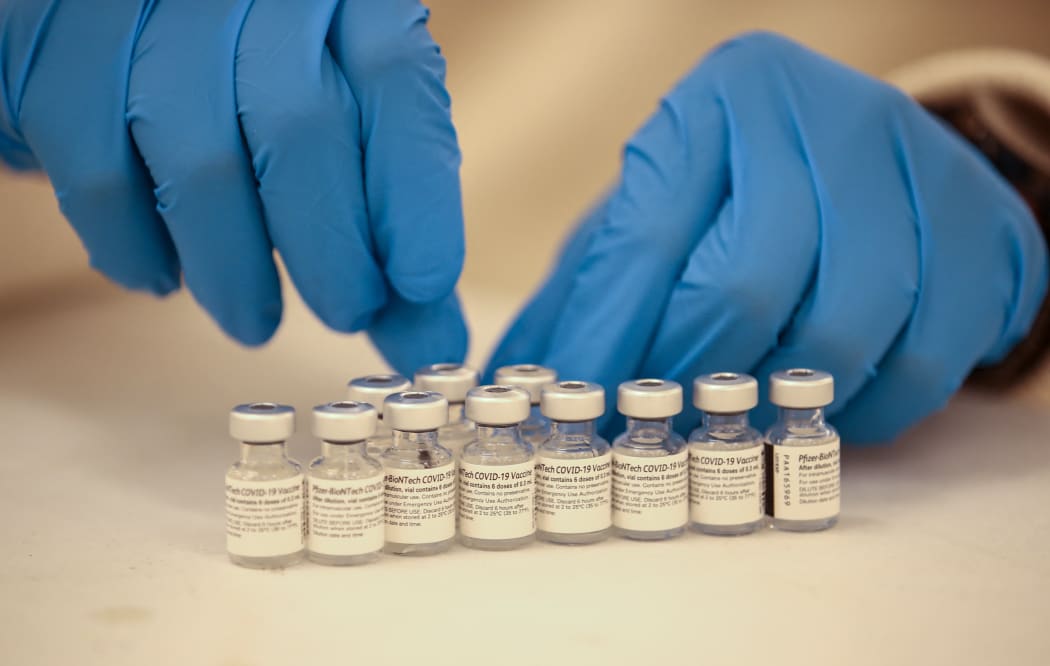While many people in New Zealand have jumped on the chance to get vaccinated for Covid-19, it is not the case for everyone - some people yearn for hesitant family members to get vaccinated.

Photo: AFP
A number of people anonymously spoke to RNZ about the hurt and dysfunction their families are experiencing.
For the majority, their family members are hesitant to get vaccinated, rather than being firmly anti-vax, but conversations about it often ended in arguments.
Mary* said her grandma was hesitant and it had made things awkward.
"She says that she's old and these things don't really matter anymore to her," Mary said.
"But my mother, [who is a] nurse, is insistent that she gets the vaccine for the family's benefit really and to benefit everyone else."
She said her grandma would call her claiming her mother was "bullying her, in her point of view" whilst she was also trying to convince her to get vaccinated.
"It's not very nice."
Mary was concerned about what would happen to her grandma, who had underlying health conditions, if she was infected with Covid-19.
"It would be really sad if she got it and something bad happened to her."
Ruby*, who is pregnant, had a similar situation with her grandparents.
She said their hesitancy stemmed from thinking the vaccine had not been adequately tested.
Evidence showed the Pfizer-brand vaccine being given in Aotearoa New Zealand was 95 percent effective after both doses.
The Pfizer vaccine was provisionally approved for use in New Zealand after undergoing a thorough assessment process. The approval is conditional on Pfizer providing Medsafe with ongoing data showing that it meets international standards.
Ruby said her grandma was asked to get vaccinated when another family member recently gave birth but refused.
"So then when I caught up with her she was just like, 'oh, but you'll let me see your baby won't you?' and I was like 'well, no'," Ruby said.
Things were now at a point where her family would try to "laugh it off to process in a way because it just seems so absurd".
Anne* was worried her "young, well-educated" sister was becoming an anti-vaxxer.
Her sister was "not really the sort of person you imagine becoming anti-vax" but she now said some "outlandish" things.
Sometimes Anne would "get really mad" at her sister "because it seems so unreasonable and selfish" and she was "scared to think what could happen to her".
"We have other family members who would literally die if they caught [Covid-19]."
Tom* said his brother was openly vaccine-hesitant and, similar to Anne's sister, began questioning things in a time when he was isolated from others and spent a lot of time online.
They're both concerned how easily convinced their siblings had been by misinformation.
Tom said his family originally took things with a grain of salt but that had changed.
"We ignore it instead of engaging in conversation," he said.
"It's become too frustrating."
Tom said he and his brother "have always had a very open and honest dialogue".
"This is one thing I've given up on trying to talk about with him."
Clinical immunologist Dr Maia Brewerton said being vaccine-hesitant was not the same as being an anti-vaxxer, which she labelled a very small group that likely would not change their stance.
But she believed most people's perspectives could be changed.
Brewerton, who is part of the government's Strategic Covid-19 Public Health Advisory Group, said she saw three common reasons people were hesitant: a fear of injections and needles, unanswered questions, or a lack of trust in the health system.
Brewerton said if people were hesitant, it was better to share your own experience rather than bombarding them with facts.
She said it was important they felt their concerns were being heard, instead of everyone becoming defensive and fighting to be right.
"I don't want anybody who's feeling unsure about the vaccine to feel attacked," Brewerton said.
Hesitant people had often heard something frightening and were coming from a place of fear and protection, she said.
That meant it was important they had an opportunity to ask questions and have them answered with good information.
Brewerton was "really open" with her patients about the fact there were "small risks" with the vaccine - "although it is very safe".
"But also in the discussions, it's helpful to say that we have to also recognise these risks of this virus, which isn't going anywhere either."
Brewerton said it was important to note no one was being forced to get vaccinated.
She also wanted people to remember it was good for everyone if as many people are vaccinated as possible.
*Names have been changed to protect the identities of those speaking about their families.


